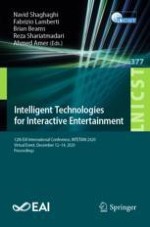2021 | OriginalPaper | Buchkapitel
Is Learning by Teaching an Effective Approach in Mixed-Reality Robotic Training Systems?
verfasst von : Filippo Gabriele Pratticò, Francisco Navarro Merino, Fabrizio Lamberti
Erschienen in: Intelligent Technologies for Interactive Entertainment
Aktivieren Sie unsere intelligente Suche, um passende Fachinhalte oder Patente zu finden.
Wählen Sie Textabschnitte aus um mit Künstlicher Intelligenz passenden Patente zu finden. powered by
Markieren Sie Textabschnitte, um KI-gestützt weitere passende Inhalte zu finden. powered by
